When you first install the Sufio app in your Shopify online store, Sufio sends invoices to your customers from an email address in the your-shop-name@sufioemail.com format.
This way, your customers receive emails from Sufio even if you haven’t yet authenticated your email domain in Sufio.
If you would prefer your customers to see your emails as sent from your sender email address you set up in Sufio, you will need to authenticate your email domain for Sufio to send emails on behalf of your domain.
This way, you ensure that the emails from Sufio comply with your domain's DMARC policy, and that they are sent from your own domain rather than on behalf of it.
This article will walk you through the steps of the setup process if you manage the domain of your store in Shopify.
Note
Authentication of email domains is only available in the Growth plan and higher.
Note
Follow the steps in this article if you use a domain management system other than Shopify.
To authenticate your email domain, you will need to set up DNS records for Sufio on your domain.
Sufio automatically generates all the necessary DNS records for you. Make sure you enter them in your Shopify admin.
Sufio will then verify the DNS records and, once authenticated, begin sending emails on behalf of your domain.
Please note that you can only authenticate domains you own. Domains from email service providers, such as gmail.com or yahoo.com, cannot be authenticated.
To generate the DNS records for your email domain:
- In your Sufio account, go to the Settings → Emails page.
- In the Sender email section, click on Set up DNS records.

Note
Within your domain (for example, acmeshop.com), Sufio uses its own subdomain, such as invoices-txhq.acmeshop.com, for the DNS records used to authenticate your domain. This is to protect the reputation of your primary domain, especially when sending a high volume of emails.
These DKIM and SPF records are required for Sufio to be able to send emails on behalf of your email domain.
DomainKeys Identified Mail (DKIM) is an authentication method used to verify that the emails come from the actual sender and not from someone that pretends to be the sender. When a receiving server checks a Sufio email sent from your domain, it verifies that the email was signed with a DKIM key from Sufio.
To set up DKIM records for your custom mailing domain:
- Open the list of DNS records for your email domain.
- From the Required records in your Sufio account, navigate to the CNAME type configuration snippets.

- In your Shopify admin, go to the Settings → Domains page and click the domain you use for your store.
- From the Domain settings dropdown, select Edit DNS settings.
- From the Add custom record dropdown, click on CNAME record.
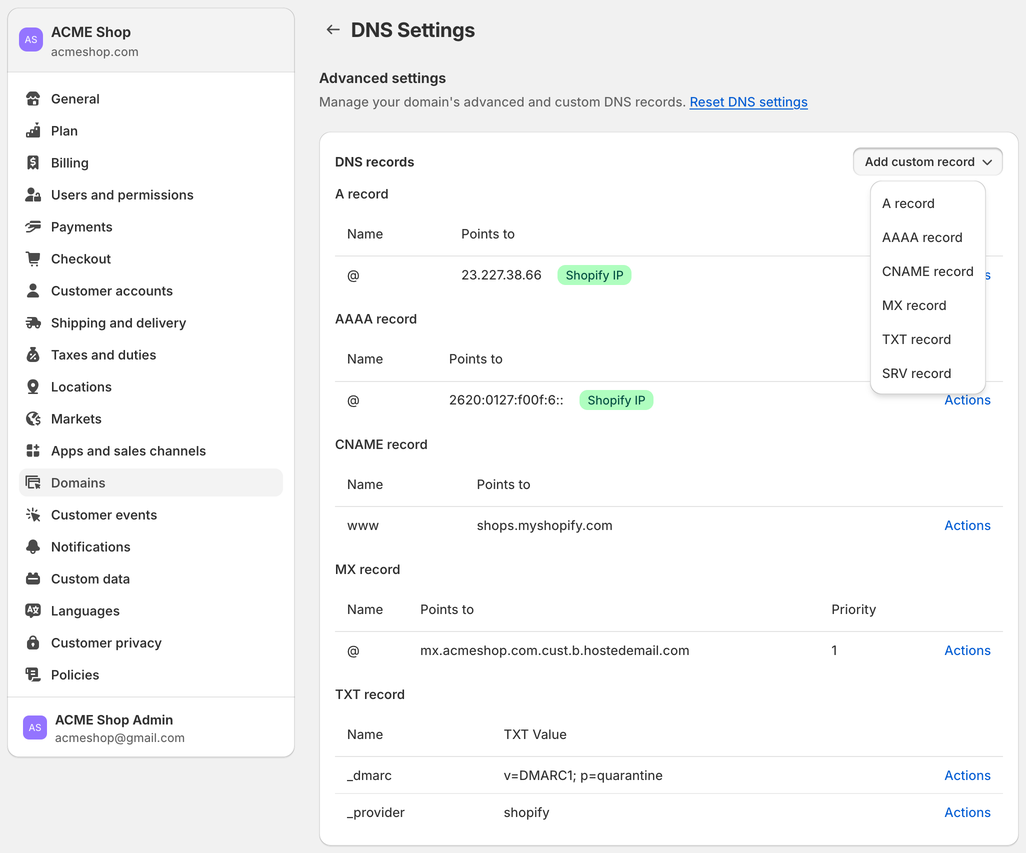
- In the Name and Points to fields, copy and paste the values from your Sufio account and click on Confirm.
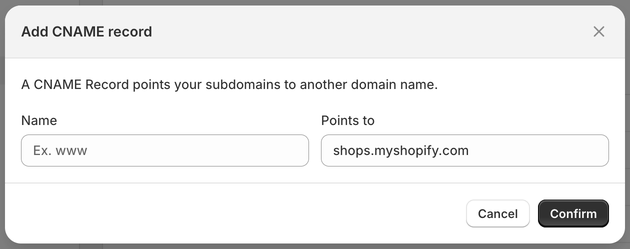
- Repeat the previous step for the second CNAME type record from the list of DNS records.
Sender Policy Framework (SPF) is a text record added to the Domain Name System (DNS) that contains the domain names of all the servers you authenticated to use your domain name to send emails.
To set up an SPF record:
- Open the list of DNS records for your email domain.
- From the Required records in your Sufio account, navigate to the TXT type configuration snippet.

- In your Shopify admin, go to the Settings → Domains page and click the domain you use for your store.
- From the Domain settings dropdown, select Edit DNS settings.
- From the Add custom record dropdown, click on TXT record.
- In the Name and TXT value fields, copy and paste the values from the Sufio account and click on Confirm.
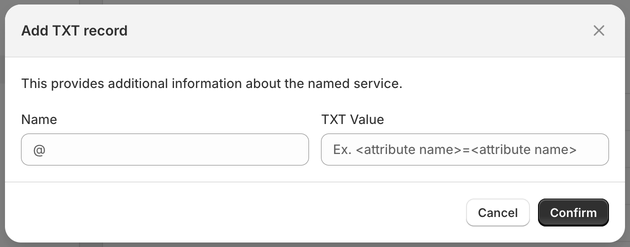
These MX records are not essential for Sufio to send emails on your behalf. However, they improve the tracking of email deliverability.
Proper configuration allows Sufio to inform you whether or not the customer has successfully received their email.
Mail Exchange (MX) records are used to direct incoming mail for an email address to a specific server address.
That means when a customer receives an email from Sufio, their server sends back a confirmation that the email was received. The MX record ensures the confirmation is sent back to Sufio.
To set up an MX record:
- Open the list of DNS records for your email domain.
- From the Recommended records in your Sufio account, navigate to the MX configuration snippets.
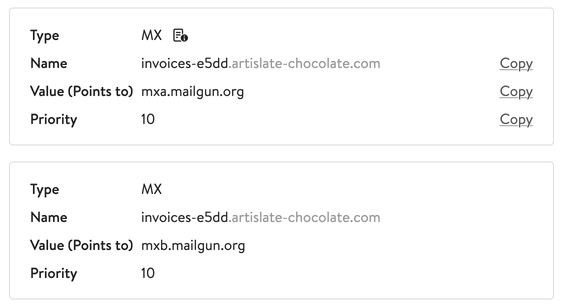
- In your Shopify admin, go to the Settings → Domains page and click the domain you use for your store.
- From the Domain settings dropdown, select Edit DNS settings.
- From the Add custom record dropdown, click on MX record.
- In the Name, Points to, and Priority fields, copy and paste the values from the Sufio account and click on Confirm.
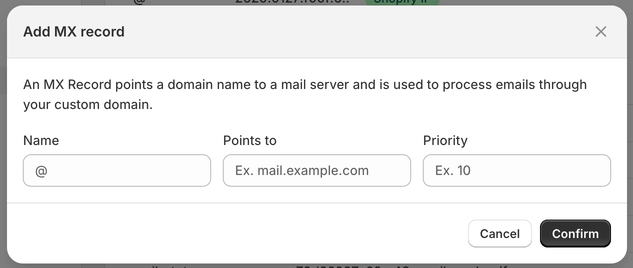
- Repeat the previous step with the second set of values.
Note
Because Sufio uses its own subdomain for sending emails with documents, these MX records will only be used to track deliverability of emails sent by Sufio, but not any other email sent from your domain.
A DMARC policy record ensures that email providers can authenticate messages claiming to come from your domain, enhancing email security.
If you have no DMARC policy record set up for your domain yet, our popup will display an example DMARC record. The record provided includes only the minimum requirements, but you can also set up a stricter DMARC policy to enforce higher security standards.
To set up an a DMARC record:
- Open the list of DNS records for your email domain.
- Navigate to the DMARC Policy record configuration snippet.

- In your Shopify admin, go to the Settings → Domains page and click the domain you use for your store.
- From the Domain settings dropdown, select Edit DNS settings.
- From the Add custom record dropdown, click on TXT record.
- In the Name and TXT value fields, copy and paste the values from the Sufio account and click on Confirm.
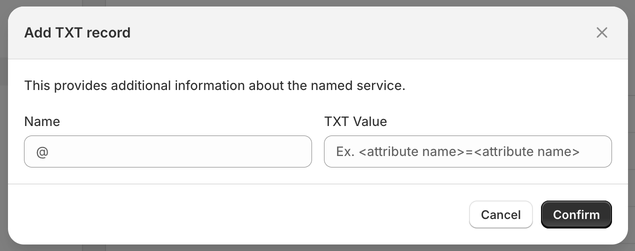
Once you have correctly set up the DNS records mentioned above (including the correct record type) in Shopify, you will need to authenticate these records in Sufio.
- In your Sufio account, go to the Settings → Emails page.
- In the Sender email section, click on Set up DNS records.
- Scroll to the bottom of the popup window and click on Authenticate domain.
Sufio automatically verifies that your email domain is correctly set up, and starts sending emails on behalf of your email domain.
Note
Please note you may have to wait up to 48 hours before any changes you make to your DNS records take effect.
Professional invoices for Shopify stores
Let Sufio automatically create and send beautiful invoices for every order in your store.
Install Sufio - Automatic Invoices from the Shopify App Store